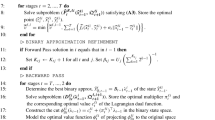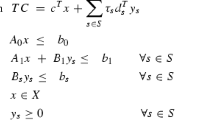Abstract
In this paper we present a new Benders decomposition method for solving stochastic complementarity problems based on the work by Fuller and Chung (Comput Econ 25:303–326, 2005; Eur J Oper Res 185(1):76–91, 2007). A master and subproblem are proposed both of which are in the form of a complementarity problem or an equivalent variational inequality. These problems are solved iteratively until a certain convergence gap is sufficiently close to zero. The details of the method are presented as well as an extension of the theory from Fuller and Chung (2005, 2007). In addition, extensive numerical results are provided based on an electric power market model of Hobbs (IEEE Trans Power Syst 16(2):194–202, 2001) but for which stochastic elements have been added. These results validate the approach and indicate dramatic improvements in solution times as compared to solving the extensive form of the problem directly.
Similar content being viewed by others
References
Ahn B. H., Hogan W. W. (1982) On convergence of the PIES algorithm for computing equilibria. Operations Research 30(2): 281–300
Belknap, M. H., Chen, C. H., & Harker, P. T. (2000). A gradient-based method for analyzing stochastic variational inequalities with one uncertain parameter. OPIM Working Paper 00-03-13. Department of Operations and Information Management, Wharton School, March.
Benders J. F. (1962) Partitioning procedures for solving mixed-variables programming problems. Numerische Mathematik 4: 238–252
Birge J. R., Louveaux F. (1997) Introduction to stochastic programming. Springer, New York
Brooke, A., Kendrick, D., Meeraus, A., & Raman, R. (2008). GAMS—a user’s guide. GAMS Development Corporation, Washington, DC. http://www.gams.com/docs/document.htm.
Cabero, J., Baillo, A., Cerisola, S., & Ventosa, M. (2005a). Electricity market equilibrium model with risk constraints via Benders decomposition. In INFORMS annual conference, San Francisco, November.
Cabero, J., Baillo, A., Ventosa, M., & Cerisola, S. (2005b). Application of Benders decomposition to an equilibrium problem. In 15th PSCC, Liege, August.
Chen Y., Hobbs B. F. (2005) An oligopolistic power market model with tradable Nox permits. IEEE Transactions on Power Systems 20(1): 119–129
Dantzig G., Wolfe P. (1961) The decomposition algorithm for linear programs. Econometrica 29(4): 767–778
De Wolf D., Smeers Y. (1997) A stochastic version of a Stackelberg–Nash–Cournot equilibrium model. Management Science 43(2): 190–197
Dupačová J., Grőwe-Kuska N., Rőmisch W. (2003) Scenario reduction in stochastic programming. Mathematical Programming 93(3): 493–511
Egging R., Gabriel S. A. (2006) Examining market power in the European natural gas market. Energy Policy 34(17): 2762–2778
Egging R., Gabriel S. A., Holz F., Zhuang J. (2008) A complementarity model for the European natural gas market. Energy Policy 36: 2385–2414
Facchinei F., Pang J.-S. (2003) Finite-dimensional variational inequalities and complementarity problems. Springer, New York
Ferris, M. C., & Munson, T. S. (2005). PATH 4.6. GAMS Development Corporation, Washington, DC. http://www.gams.com/docs/document.htm.
Fuller J. D., Chung W. (2005) Dantzig–Wolfe decomposition of variational inequalities. Computational Economics 25: 303–326
Fuller J. D., Chung W. (2007) Benders decomposition for a class of variational inequalities. European Journal of Operational Research 185(1): 76–91
Gabriel, S. A., & Fuller, J. D. (2008). A Benders method for solving stochastic complementarity problems with an application in energy. In CORS/optimization days joint conference, Quebec City, May.
Gabriel S. A., Kiet S., Zhuang J. (2005a) A mixed complementarity-based equilibrium model of natural gas markets. Operations Research 53(5): 799–818
Gabriel S. A., Zhuang J., Egging R. (2009) Solving stochastic complementarity problems in energy market modeling using scenario reduction. European Journal of Operational Research 197(3): 1028–1040
Gabriel S. A., Zhuang J., Kiet S. (2005b) A large-scale complementarity model of the North American natural gas market. Energy Economics 27: 639–665
García-Bertrand R., Conejo A. J., Gabriel S. A. (2006) Electricity market near-equilibrium under locational marginal pricing and minimum profit conditions. European Journal of Operational Research 174: 457–479
Genc T. S., Reynolds S. S., Sen S. (2007) Dynamic oligopolistic games under uncertainty: A stochastic programming approach. Journal of Economic Dynamics and Control 31(1): 55–80
Global Competition Review. (2003). Gas regulation in 26 jurisdictions worldwide. http://www.globalcompetitionreview.com.
Gröwe-Kuska, N., Heitsch, H., & Römisch, W. (2003). Scenario reduction and scenario tree construction for power management problems. In A. Borghetti, C. A. Nucci, & M. Paolone (Eds.), IEEE Bologna Power tech proceedings.
Gürkan G., Özge A. Y., Robinson S. M. (1999) Sample-path solution of stochastic variational inequalities. Mathematical Programming 84: 313–333
Haurie A., Moresino F. (2002) S-Adapted oligopoly equilibria and approximations in stochastic variational inequalities. Annals of Operations Research 114: 183–201
Haurie, A. & Zaccour, G. (2005). S-Adapted equilibria in games played over event trees: An overview. In A.S. Nowak et al. (Eds.), Advances in dynamic games. Annals of the International Society of Dynamic Games, 7, 417–444.
Haurie, A., Zaccour, G., Legrand, J., & Smeers, Y. (1987). A stochastic dynamic Nash–Cournot model for the European gas market. Technical Report G-86-24, GERAD, Ecole des Hautes Etudes Commerciales, Montréal, Québec, Canada.
Heitsch H., Römisch W. (2003) Scenario reduction algorithms in stochastic programming. Computational Optimization and Applications 24: 187–206
Hobbs B. F. (2001) Linear complementarity models of Nash–Cournot competition in bilateral and POOLCO power markets. IEEE Transactions on Power Systems 16(2): 194–202
Metzler C., Hobbs B. F., Pang J.-S. (2003) Nash–Cournot equilibria in power markets on a linearized DC network with arbitrage: Formulations and properties. Networks & Spatial Economics 3(2): 123–150
Nocedal J., Wright S. J. (1999) Numerical optimization. Springer, New York
Römisch, W., Dupačová, J., Gröwe-Kuska, N., & Heitsch, H. (2003). Approximations of stochastic programs. Scenario tree reduction and construction. GAMS Workshop, Heidelberg, September 1–3, Berlin: DFG Research Center.
Shanbhag, U., Glynn, P., & Infanger, G. (2005). A complementarity framework for forward contracting under uncertainty. In INFORMS annual conference, San Francisco, November.
Shanbhag, U., Infanger, G., & Glynn, P. (2008). A complementarity framework for forward contracting under uncertainty (under review).
Waller, S. T. (2000). Optimization and control of stochastic dynamic transportation systems: Formulations, solution methodologies, and computational experience. Ph.D. Dissertation, Northwestern University, Chicago.
Yao J., Adler I., Oren S.S. (2008) Modeling and computing two-settlement oligopolistic equilibrium in a congested electricity network. Operations Research 56(1): 34–47
Zhuang J., Gabriel S. A. (2008) A complementarity model for solving stochastic natural gas market equilibria. Energy Economics 30(1): 113–147
Author information
Authors and Affiliations
Corresponding author
Rights and permissions
About this article
Cite this article
Gabriel, S.A., Fuller, J.D. A Benders Decomposition Method for Solving Stochastic Complementarity Problems with an Application in Energy. Comput Econ 35, 301–329 (2010). https://doi.org/10.1007/s10614-010-9200-8
Accepted:
Published:
Issue Date:
DOI: https://doi.org/10.1007/s10614-010-9200-8




